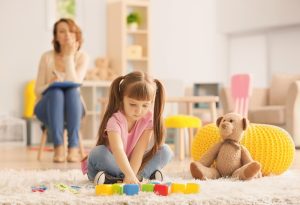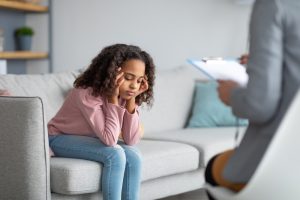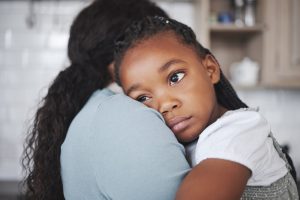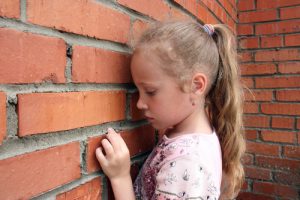Grief is a universal and unbiased in who it afflicts. Unfortunately, children suffer in this fallen world of pain and loss. Throughout the world, children are plagued with horrible images that adults in many nations would never imagine. Children are victims of war, bombings, loss of family and many traumatic incidents. Children are abused in every corner of the world and face horrible trauma. Beyond the most traumatic events, children experience loss at early ages. The loss of a grandparent, or family member, or even a beloved pet. No loss is too small for a child.
Licensed counselors who specialize in children psychology and have training in Play Therapy can help children face trauma, grief and loss. In addition, many licensed professionals and human service professionals earn additional certifications to help children. Some may even specialize in Child and Adolescent Grief Counseling and have a greater understanding of children and the nature of loss. Licensed professionals with specialties and additional training certificates can help children process emotional pain because they are trained to identify and communicate to children. Play Therapy is one type of advanced counseling technique that counselors can utilize to help children.

Children grieve differently from adults due to their brain development. Many children are so young that many communicate skills have yet to develop. Children sometimes do not know how to say what emotionally hurts or what is bothering them because they do not know how to articulate it. Children are more right brain developed and many of the feelings, traumas and losses associated with them are experienced in the lower areas of the brain. The Amygdala, Hippocampus, and Thalamus are non-verbal areas of the brain and with children, one must engage in non-verbal ways. In addition, while children have billions of brain cells still forming and becoming more complex within their first five years, these neural pathways are still not complex enough to effectively communicate. The Pre-Frontal Cortex of the adult brain possesses the ability to better communicate, while the child’s less developed area to communicate still needs time. Hence counselors who deal with children, utilize a variety of non-verbal ways to help the child express. Understanding that communication and judgement are operations of the higher parts of the brain, counselors look for signs from the lower areas of the brain that are more primal in expression.
It is because children have less verbal communicate abilities that counselors must look for visible manifestations of emotion within children which can be displayed during play. Among the most common types of physical signs of emotional distress in children, Melinda points out tension, fidgeting, repetitive movements, aggression, self harm, low energy, increased heart rate, hyperactivity, somatic pains, and rapid breathing as things to watch for with children as a way they express emotional distress (2018). These types of physical signs can manifest in counseling, play therapy, or at school or home in children experiencing emotional issues. Many children brought to therapy are already manifesting various social outbursts or behavioral issues that are merely ways of attempting to express difficult emotions due to loss, trauma, or grief.
Play Therapy and Grief
Alan Wolfelt points out that helping children grieve is not just about therapy but is a companioning experience that involves actively participating in the child’s healing (p.1, 2012). Play Therapy involves actively entering into the child’s world, earning the child’s trust, creating a safe place for the child to express in his/her own way and being able to translate those expressions and help the child heal.
Play Therapy owes its origin to Hermine Hug-Helmuth who in 1921, first introduced ideas of allowing children to express themselves in play with toys and other games. Melanie Klein, as well, was a pioneer in the field who discovered that play was a doorway into the child’s subconscious mind. Later in 1938, David Levy would utilize toys and other objects chosen by the child as a way to identify past trauma and relive the traumatic event via play. This became known as Release Therapy. Joseph Solomon employed Active Play as a way to allow children to express emotions such as a fear and anger in a controlled way to help them become more able to interact later socially
Counselors utilize Play Therapy as a way to be build relationship with the child to earn a way into their inner mind according to Anna Freud. Carl Rogers also saw Play Therapy as a way to center the therapy around the needs of the child and build genuine and trustful relationships. These are all critical elements in helping the child express. It is time consuming but necessary to help the child trust and be able to learn the language of the child during play.

During Play Therapy, the counselor wants to give the child controlled freedom. The child is allowed to choose the toys in the room or games. The counselor does not look to push serious questions but instead observes and plays with the child. Usually sitting at eye level with the child, the counselor will ask the child about the toys or games the child likes and enjoys. Many times, the counselor will reflect and repeat what the child says and encourage the child to name the toys and express how the toys make them feel. To the foreign eye, it may seem as nothing is occurring but the counselor is attempting to not only gain trust, but is also engaging the child at symbolic and non-verbal way looking for cues of the child’s behavior. In other ways, the counselor is attempting to help the child better express verbally by granting the child freedom of labeling and naming toys. Some counselors may approach with a more directly with more interaction, while others may be less direct.
The room itself is a play room with numerous options for the child to choose from. This includes miniature figures, dolls, doll houses, stuffed animals, puppets, legos, building materials, and other sporting equipment. The toys are a doorway to the child’s symbolic mind and help facilitate healthy expression. Counselors may utilize other ways to express and open creative mindsets through songs and music, story telling or through uses of art, drawing, clay and painting. The key is to help the child tell his/her story, find healing, and discover other ways to find outlets and creative ways to express and rediscover oneself.
Some children who may be grieving, may use dolls or action figures as a way to reflect the life of family members around them. This symbolic expression correlates with their inability to express verbally but through play and expression instead. A child who may be experiencing grief over the loss of a family member, may play out death with a doll or action figure. In addition, certain toys or games or songs may trigger within the child physical symptoms of discomfort that the counselor may identify and notate. During certain activities, children may share information that otherwise would never emerge in an adult conversation.
Conclusion
All people grieve and children are no exception. When children are emotionally hurting, they sometimes do not act logically. To help children grieve and express emotion, counselors need to understand the language of the child. Due to brain development that is not as verbal in children, Child Grief Counselors need to understand the symptoms of emotional distress in children via Play Therapy. Play Therapy helps the child find safety and trust in expressing issues in the child’s own special way during play. Child Grief Counselors who specialize in Play Therapy can help children heal during play by allowing them to express in conducive and healthy ways.

AIHCP offers a specialty certification in Child and Adolescent Grief Counseling for the American Academy of Grief Counseling’s certified Grief Counselors. This certification trains and educates Grief Counselors in the knowledge of grief in children. While pastoral and non licensed counselors can help individuals with grief, only licensed counselors with grief background, child psychology and training in Play Therapy are permitted to treat children suffering from emotional damage. Pastoral counselors trained in Grief Counseling and Child Grief Counseling, if not licensed, should refer children to clinical professionals with Play Therapy training.
AIHCP’s Child and Adolescent Grief Counseling Certification is online and independent study and open to qualified pastoral and clinical human service professionals, as well as those in the healthcare fields.
References and Additional Resources
Wolfelt, A. (2012). “Companioning the Grieving Child”. Companion Press
Good Therapy. “Play Therapy”. Access here
Melinda, S. et al. (2018). “Why Is Engaging a Child’s Brain and Body in Therapy Important?”. Good Therapy. Access here
Sutton, J. (2017). “Play Therapy: What Is It and How Does It Work?” Positive Psychology. Access here
Cohen, J. (2023). “How to Help Children Cope With Death and Grief”. Psychology Today. Access here





